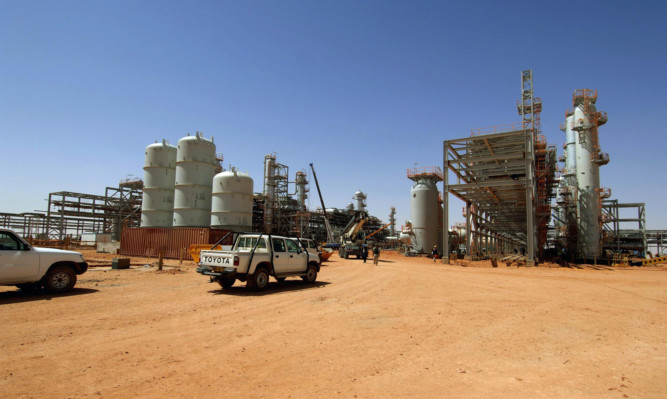Confusion surrounds the fate of British hostages including a “number of Scots” after Algerian forces stormed a desert gas complex taken over by terrorists, causing a bloodbath.
Amid conflicting reports, it emerged late last night that possibly as many as 30 hostages had been killed in the botched operation including two Britons, two Japanese and one French national.
Reports said 11 of the terrorists were also killed as the two-day siege ended in gunfire and explosions at the In Amenas natural gas plant in the Sahara Desert.
Algerian communications minister Mohand Said Oubelaid said: “An important number of hostages were freed and an important number of terrorists were eliminated, and we regret the few dead and wounded.”
There were unconfirmed reports yesterday that one of the hostages is from the Perth area. His fate in unknown.
The militants reportedly led by the veteran jihadist Mokhtar Belmokhtar threatened previously to “eliminate” the hostages if they were attacked.
There were reports that Algerian army helicopters had strafed the complex during the rescue.
Several world leaders expressed unease at the reports of heavy casualties following the operation to free the hostages.
British offers of assistance to Algeria in dealing with the situation were declined and diplomatic tensions were exposed over the unilateral action.
Last night, Prime Minister David Cameron said the country should be “prepared for the possibility of further bad news”.
One British citizen was already confirmed dead in the initial attack by the terrorists on the complex.
Earlier yesterday, Scotland’s First Minister Alex Salmond confirmed there were a “number of Scots” among the hostages.
Mr Salmond told MSPs at Holyrood: “I should tell the chamber that I spoke with the Prime Minister this morning about the hostage-taking situation in Algeria.
“I can confirm to the chamber a number of Scots are among the hostages.
“The priority is their safety and of course to keep the families informed. The Scottish police service is fully engaged with the Metropolitan Police on the latter and Scottish Government ministers are in contact with the Foreign and Commonwealth offices on the former.”
Mr Cameron spoke last night after it emerged Britain had not been warned of the military rescue operation despite the Prime Minister asking his opposite number to keep him fully informed.
“It’s a fluid situation. It’s ongoing. It’s very uncertain,” Mr Cameron said.
“We should be prepared for the possibility of further bad news, very difficult news, in this extremely difficult situation.”
The Government’s emergency Cobra committee met twice yesterday, with Mr Cameron in the chair, and he said they would continue “working around the clock to do everything we can to keep in contact with the families, to build the fullest possible picture of the information and the intelligence”.
“I will do everything I can to update people about what is a difficult and dangerous and potentially very bad situation,” he said.
